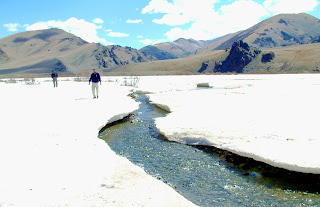Mongolia, desert, bikes and storms
This is the second blog about my Mongolian bike ride; a charity ride raising funds for the National Deaf Children's Society. We were in the middle of the ride in southern Mongolia and just moving north away from the Gobi Desert towards the Khangai Mountains. The 20 riders and the support crew had established a daily pattern which involved briefings and approximately 60km rides through magnificent, remote valleys and hills. This blog highlights one day in which there was an epic bike ride. All mountain bikers have an epic bike ride at least once. I've had a few but this is one of the most epic. It's all about the weather.
What stood out for me in Mongolia was the rapid changes in weather. I was there in June - mid summer. And, when the sun was out, it was warm - hot even. But, many rivers had thick ice on the edges, sometimes up to a metre thick. This was difficult for me to grasp; warm weather and ice?
As the sun went down the temperature plummeted. Cold nights are not unknown in deserts due to the clear night skies that allow the day's heat to escape rapidly and Mongolia is famous for its clear blue skies. But clear blue skies were not something seen all day, every day, as in the South African highveld winter. Far from it...
A few days into the ride we woke to light drizzle. But it was reasonably warm and we set off into weather which got progressively worse. We were wearing shorts and summer shirts but were soon cold. After about 15km we stopped for tea in the support truck and, following a quick discussion, decided to try to continue. I managed to find a warmer cycling top but soon after leaving the truck the weather got worse. I was riding head down into the gale and just pedalled as hard as I could, focussing on the few metres in front of me and blanking out the cold and wet. Somehow I pulled ahead of the main group. Then it started to snow! We had agreed in the truck that we would reassess conditions after 10 km. As I approached the waiting truck, I resolved not to stop and was riding fast to keep warm. Sitting, wet in a truck, waiting for slower riders was not an option for me and I blazed past the truck on my own, trying unsuccessfully to keep warm. At some point three other riders caught me, having made the same decision to continue. We encouraged each, other taking turns working on the front. My feet were numb and my hands, in fingerless gloves, too cold and stiff to change gear. At more than one point we waded through rivers of melt water, adding to our discomfort. On reflection, it was more immediately before entering the water and emerging into the bitter wind, cold and wet that was so unpleasant, rather than actually wading through the water.
Eventually as we came over one of many hills we saw one of the the support trucks! And beyond the truck, about a kilometre away, was the village of Tseterleg, our lunch venue! We raced the truck into the village to a small hostel. The four of us just dropped the bikes and staggered inside, numb with cold. As we collapsed, delighted to be out of the wind and rain, we were offered tea and cake. We cradled the warm tea in frozen hands and devoured the cake, not caring if we finished it all. While we were gulping sustenance, incredulously, a voice asked if we wanted a shower!
I was last in the shower and spent the waiting time anticipating the feel of warm water, the first for several days. The brilliant support team had got to the hostel ahead of us and arranged this reception. They even organised a power wash of our bikes, which had also been through a lot.
Only nine of us managed that morning's ride. The others, sensibly, seeking shelter in the main truck. That evening our team leader called it the day from hell. But when we pitched our campsite outside Tseterleg we noted nods of approval and smiles from the Mongolian support team. By the time lunch was eaten, the storm had blown over and we explored Tseterleg under a sunny blue sky!
In Tseterleg there was a supermarket where we eagerly stocked up on supplies including Chingis Khan vodka, and spent ages photographing a Buddhist temple, one of the main religions in Mongolia. Tseterleg reminded me of small villages in Africa and of Alice Springs in Australia. But unique to Mongolia was the array of stuff just lying around the village: animal bones, skulls, tow hitch, tyres, the odd shoe and a few side shafts. Eventually, of all places, we ended up in a disco, in the dark with strobe lights and beers, it was incongruous to say the least! It was six in the evening. I sat in shorts and T shirt drinking a cold beer reflecting on the epic ride a few hours earlier. Ekbold, our Mongolian support handyman, looked over the rim of his beer glass and said he saw nothing out of the ordinary!






















